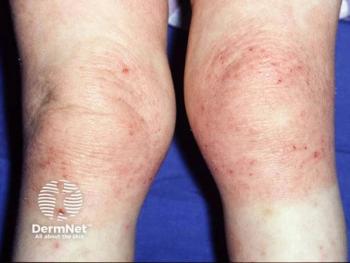
- Dermatology Times, January 2020 (Vol. 41, No. 1)
- Volume 41
- Issue 1
Don't use vinegar to treat atopic dermatitis
Bathing in a 0.5% apple cider vinegar solution isn’t a useful treatment for atopic dermatitis, and it can be irritating to the skin, report researchers in a recent study.
Bathing in a 0.5% apple cider vinegar solution isn’t a useful treatment for atopic dermatitis, and it can be irritating to the skin, researchers report in a study published in the September/October issue of Pediatric Dermatology.
Skin barrier dysfunction in people with atopic dermatitis, or eczema, often results in high transepidermal water loss, alkaline skin pH and Staphylococcus aureus colonization. Topical apple cider vinegar is a popular, emerging option that patients and parents think is safer or more natural than prescriptions like topical steroids. And while there is some evidence that dilute apple cider vinegar might improve skin barrier integrity in atopic dermatitis, there isn’t strong safety and efficacy data to support its use in atopic dermatitis, according to the paper.
Researchers studied 11 atopic dermatitis patients and 11 healthy controls. Subjects who were 12 years and older and included Caucasians, African Americans and Asians with mild-to-severe disease soaked both forearms ten minutes each day for 14 days. One forearm was soaked in 0.5% acetic acid, or apple cider vinegar, and the other in water. Researchers measured transepidermal water loss and skin pH on day one before, and up to one hour after the first soak and 24 hours after completing the two weeks of daily soaks.
Researchers found transepidermal water loss increased and pH decreased right after apple cider vinegar treatment, but those effects were not evident at 60 minutes post treatment. More than 70% of subjects - 16 of the 22 - reported mostly mild side effects from apple cider vinegar soaks. The side effects, including forearm skin discomfort and, in one patient, severe pruritus, improved after patients discontinued the soaks.
The study suggests several things to dermatologists who recommend or are thinking about recommending apple cider vinegar to their atopic dermatitis patients, as well as to patients who might be considering it as a treatment option, according to study author Richard H. Flowers, M.D., assistant professor of Dermatology at the University of Virginia in Charlottesville, Va.
“Although we know why apple cider vinegar should work in eczema treatment, there is little data to demonstrate its effectiveness. In our study, we showed that any changes that occurred in the skin in eczema patients were not long lasting, even after several weeks of daily soaks in dilute apple cider vinegar,” according to Dr. Flowers. “In addition, we often consider natural treatments as harmless, but our study showed that this may not necessarily be true. Skin irritation can result from apple cider vinegar soaks as a treatment option. This highlights the importance of patients discussing new home remedies with their dermatologist before the first attempt. Physicians should also explain the range of potential side effects before recommending a patient undertake new home remedies.
More patients are seeking complementary and alternative medicines, including apple cider vinegar, which was an incentive for performing the study, according to Dr. Flowers.
The study’s findings have not significantly changed practice for Dr. Flowers and colleagues.
“At the University of Virginia, we actually use dilute bleach baths for atopic dermatitis much more than dilute apple cider vinegar baths,” he says. “Bleach is the other major additive patients often use, and we certainly have more data on dilute bleach baths than on apple cider vinegar. Bleach baths are used to decrease Staph aureus in patients with atopic dermatitis and some studies have shown they may improve eczema. Although their actual benefit has been called into question by recent reviews, the American Academy of Dermatology does endorse their use in patients with evidence of secondary bacterial infection (in conjunction with intranasal mupirocin ointment).”
Future studies on apple cider vinegar and atopic dermatitis are needed, Dr. Flowers says. This study is limited by its small cohort, as well as by confining the analysis to one part of the body and using a single brand and dilution of apple cider vinegar.
“Specifically, we need to examine the true effect - if any - of the apple cider vinegar on patients’ eczema and symptoms. [That’s] really the most important piece of this puzzle: to look at the effect of apple cider vinegar on Staph aureus in atopic patients and to find an optimal concentration of apple cider vinegar that does not irritate the skin,” Dr. Flowers says. “A head-to-head comparison of dilute apple cider vinegar and dilute bleach baths would be very interesting as well.”
References:
Luu, LA, Flowers, RH, Kellams, AL, et al. Apple cider vinegar soaks [0.5%] as a treatment for atopic dermatitis do not improve skin barrier integrity. Pediatr Dermatol. 2019; 36: 634– 639. https://doi.org/10.1111/pde.13888
Articles in this issue
about 6 years ago
Ultrasound technology may be useful treatment for rosaceaabout 6 years ago
DTC compounded medications: A treatment option for a system in need?about 6 years ago
Spotlight on Dermira and the QBREXZA storyabout 6 years ago
Rosacea classification system can improveabout 6 years ago
Leg psoriasis improves with topical lotionabout 6 years ago
Are CBD skincare products effective?about 6 years ago
Nonthermal energy shows promise for back acneabout 6 years ago
No-cost BRAF test aids therapeutic decision makingabout 6 years ago
Erythema severity mirrors quality-of-life impact in rosaceaNewsletter
Like what you’re reading? Subscribe to Dermatology Times for weekly updates on therapies, innovations, and real-world practice tips.











